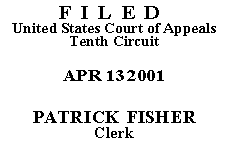

| UNITED STATES OF AMERICA,
Plaintiff-Appellee, v. DIANA ROSE LUPPI, Defendant-Appellant. |
|
Appellant Diana Rose Luppi appeals from the denial of her petition for habeas relief under 28 U.S.C. § 2255. The district court denied a certificate of appealability. See 28 U.S.C. § 2253(c). We construe appellant's notice of appeal as a renewed request for a certificate of appealability. "A certificate of appealability may issue . . . only if the applicant has made a substantial showing of the denial of a constitutional right." 28 U.S.C. § 2253(c)(2). An appellant meets this standard if she shows that her issues "are debatable among jurists, or that a court could resolve the issues differently, or that the questions deserve further proceedings." United States v. Sistrunk, 111 F.3d 91, 91 (10th Cir. 1997).
Appellant was convicted of two counts of using national forest land/roads without authorization, a misdemeanor violation of 16 U.S.C. § 551, 43 U.S.C. § 1761, and 36 C.F.R. §§ 251.50, 261.10(k), and 261.54(a). She was sentenced on December 9, 1998, to one year of probation, the conditions of which included that she cooperate fully with the United States Forest Service, complete the paperwork for an easement to permit her travel across federal land and pay all back payments within ninety days, and pay a fine of $5000. R., Vol. I, doc. 73. After appellant failed to comply with the conditions of her sentence, the government initiated probation revocation proceedings in April 1999. Id., doc. 92. These proceedings culminated in the district court's entry of an order on January 18, 2000, requiring appellant to execute the easement agreements and to pay the back payments of $650.96, and agreeing to waive the $5000 fine and the lien on appellant's property if the other conditions were met. R., Vol. II, doc. 154. Appellant completed the paperwork for the easement and paid the outstanding fees later in January 2000. The district court therefore entered an order on April 10, 2000, to dismiss the probation violation petition, reflect that the $5000 fine was waived, and order the government to release the lien on appellant's property. Id., doc. 178.
The government contends that this appeal is moot because appellant satisfied all of the requirements of the district court's January 18, 2000 order, and the district court dismissed the probation violation petition against appellant in its April 10, 2000 order. We disagree. The government has not demonstrated the absence of collateral consequences flowing from appellant's misdemeanor convictions and, therefore, this appeal is not moot. Oyler v. Allenbrand, 23 F.3d 292, 294 (10th Cir. 1994). We therefore proceed to the determination of appellant's application for a certificate of appealability.
Appellant argues on appeal that: (1) the district court erred in refusing to appoint counsel because it reserved the right to imprison her for eighteen months; (2) the district court exceeded its jurisdiction because a contract specified that jurisdiction for enforcement be handled in the state courts; (3) the district court applied the Federal Land Policy and Management Act outside its stated parameters; (4) the federal government denied appellant the equal protection of the laws by trying her as a territorial citizen instead of as a citizen of the State of Colorado; and (5) the United States Forest Service lacked authority to issue the subject citation.
Appellant raised her first and second issues on direct appeal. Because there has been no intervening change in the applicable law, the district court correctly held that these issues cannot be reconsidered in a proceeding filed under 28 U.S.C. § 2255. United States v. Cook, 997 F.2d 1312, 1318 n.6 (10th Cir. 1993).
Appellant did not raise her other arguments on direct appeal. The district court examined them and determined that they were without merit. We have considered appellant's arguments in light of the record on appeal. We find no error, and reject these arguments for substantially the same reasons as those given by the district court in its March 14, 2000 order. R., Vol. II, doc. 173.
Appellant's counsel's motion to withdraw is granted. Appellant's application for a certificate of appealability is denied and the appeal is DISMISSED. The mandate shall issue forthwith.
Entered for the Court
Circuit Judge
*. This order and judgment is not binding precedent, except under the doctrines of law of the case, res judicata, and collateral estoppel. The court generally disfavors the citation of orders and judgments; nevertheless, an order and judgment may be cited under the terms and conditions of 10th Cir. R. 36.3.